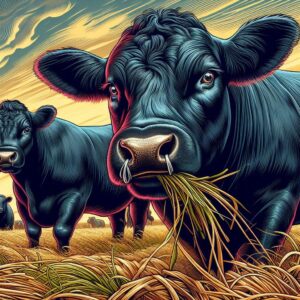Helpful Content for Ranchers: Optimizing Angus Cattle Management
Practical Advice: Angus Cattle Management
Angus cattle management encompasses the practices and strategies employed by ranchers to ensure the health, productivity, and profitability of their Angus herds. Effective management involves considerations of nutrition, breeding, healthcare, and marketing to maximize the benefits of raising Angus cattle.
Nutritional Strategies for Angus Cattle
Grass-Fed vs. Grain-Fed Systems
Ranchers can choose between grass-fed and grain-fed systems for raising Angus cattle:
- Grass-Fed: Promotes natural grazing behavior and produces leaner beef with a distinct flavor profile. It supports sustainable practices and may attract a niche market of health-conscious consumers.
- Grain-Fed: Typically results in faster weight gain and higher marbling in beef, catering to mainstream consumer preferences. Requires careful management of feed quality and quantity to avoid health issues like acidosis.
Supplementation
Regardless of the primary feeding system, supplementation is crucial:
- Mineral and Vitamin Supplements: Ensure balanced nutrition, particularly in regions with nutrient-deficient soils.
- Protein Supplements: Important during periods of low forage quality to maintain growth rates and reproductive performance.
Breeding and Genetics
Selecting Superior Genetics
Ranchers can enhance their Angus herds by:
- Artificial Insemination (AI): Allows access to superior genetics without the need to purchase high-cost breeding bulls. It also facilitates genetic diversity.
- Embryo Transfer (ET): Enables rapid multiplication of desired genetics, especially from elite females.
Crossbreeding Programs
Incorporating crossbreeding can improve herd performance:
- Hybrid Vigor: Crossbreeding Angus with other breeds, such as Hereford or Simmental, can result in offspring with enhanced growth rates, feed efficiency, and overall hardiness.
- Trait Selection: Focus on traits such as disease resistance, fertility, and carcass quality to meet specific market demands.
Health and Welfare
Preventative Healthcare
Implementing a comprehensive healthcare plan is vital:
- Vaccination Programs: Regular vaccination against common bovine diseases ensures herd health and productivity.
- Parasite Control: Effective management of internal and external parasites through deworming and insect control measures.
Welfare Practices
Maintaining high welfare standards is not only ethical but also enhances productivity:
- Stress Reduction: Minimize handling stress by using low-stress handling techniques and providing adequate shelter and comfort.
- Monitoring and Intervention: Regular health checks and prompt intervention for any signs of illness or injury.
Marketing and Economic Considerations
Direct Marketing
Exploring direct marketing avenues can enhance profitability:
- Farmers’ Markets: Selling directly to consumers at local markets can provide higher returns compared to traditional channels.
- Online Sales: Leveraging e-commerce platforms to reach a broader customer base.
Value-Added Products
Creating value-added products can diversify income streams:
- Processed Meats: Offering products such as jerky, sausages, and specialty cuts can attract niche markets.
- Agri-Tourism: Incorporating farm tours, farm stays, and educational workshops to generate additional revenue and promote the Angus breed.
Case Study: Sustainable Angus Ranching
A case study of a successful Angus ranch:
- Location: Blue Ridge Ranch, Montana.
- Practices: Emphasizes rotational grazing, conservation practices, and direct marketing.
- Outcomes: Achieved high profitability and community recognition for sustainable practices and superior beef quality.
Future Trends in Angus Cattle Ranching
Technological Advancements
Embracing technology can optimize ranching operations:
- Precision Agriculture: Using GPS and data analytics to manage grazing patterns and monitor herd health.
- Genomic Testing: Enhancing breeding decisions through detailed genetic information.
Market Trends
Staying informed about market trends ensures competitiveness:
- Consumer Preferences: Growing demand for grass-fed and organic beef.
- Regulations: Adapting to changes in food safety and animal welfare regulations.
Conclusion
Effective management of Angus cattle involves a combination of nutritional strategies, genetic improvement, health and welfare practices, and innovative marketing approaches. By staying informed and adopting best practices, ranchers can maximize the productivity and profitability of their Angus herds.
Keywords
- Cattle management
- Nutritional strategies
- Genetic improvement
- Animal welfare
- Direct marketing
How Knowledge of Angus Cattle Management Can Help Ranchers
Understanding and implementing effective management practices for Angus cattle can significantly enhance ranch productivity and profitability. By optimizing nutrition, breeding, health, and marketing strategies, ranchers can ensure the sustainability and success of their operations while meeting the demands of modern consumers.




10 thoughts on “Angus Cattle Management”
Comments are closed.